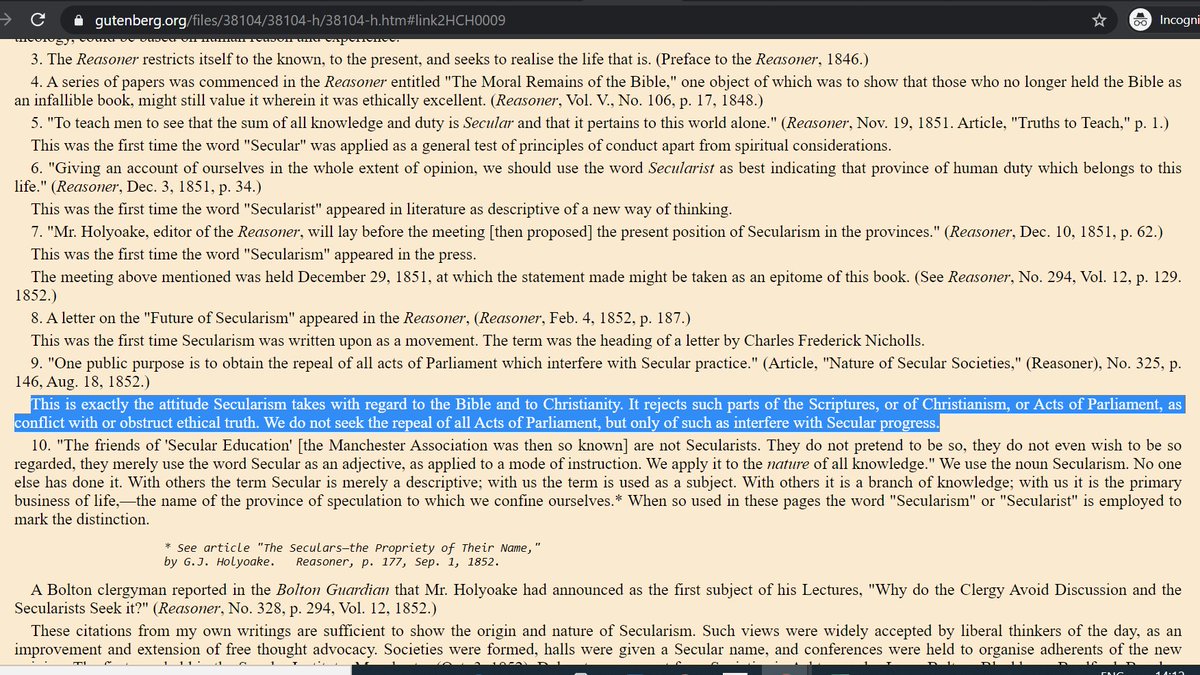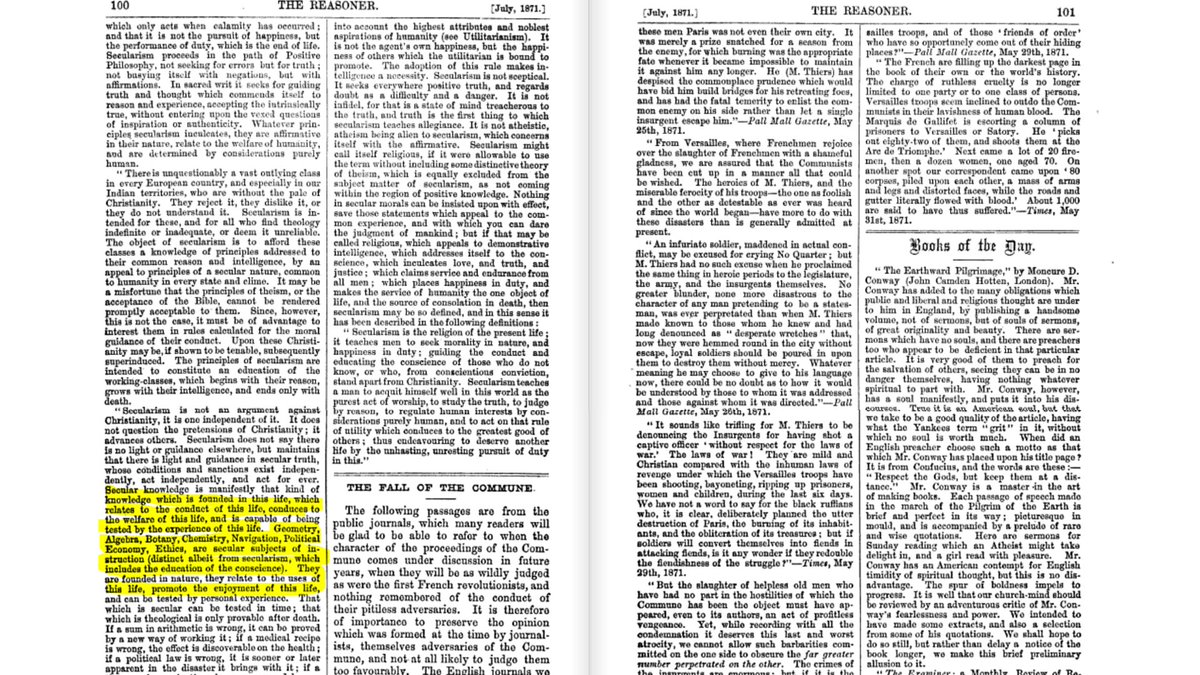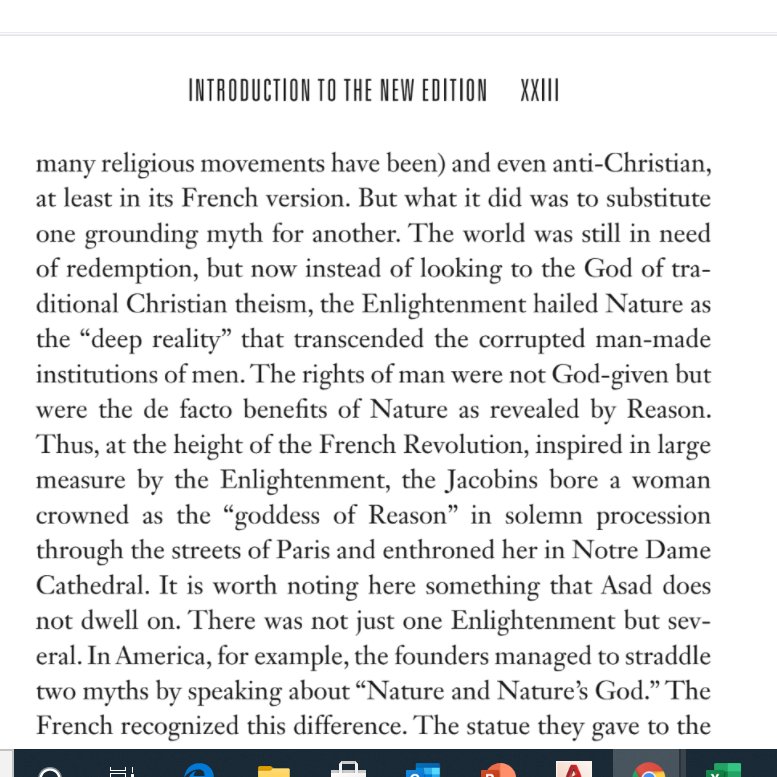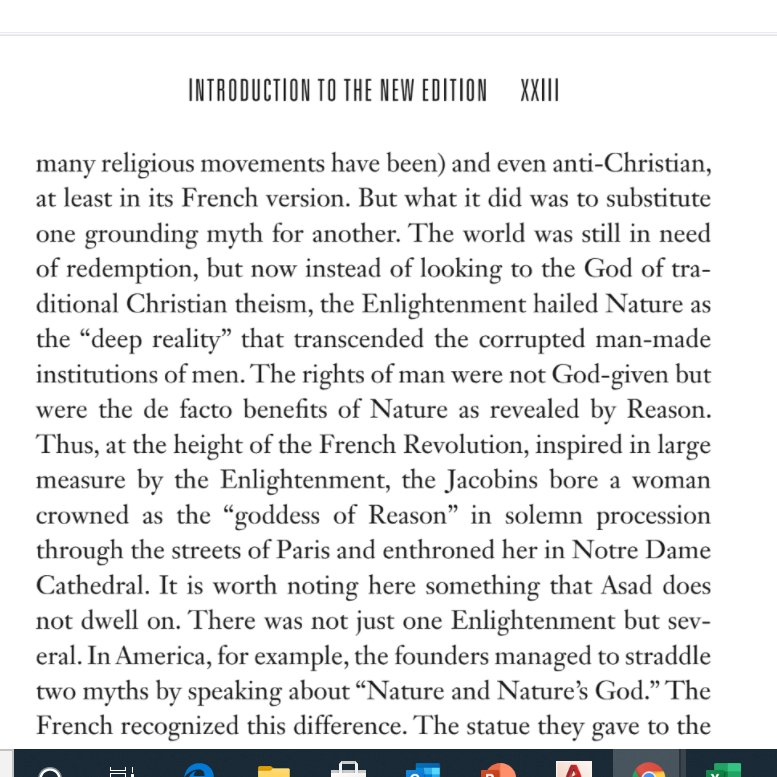1/n #Secularism
This thread explains the history and idea about it.
But before we dwell deeper, we must understand that Secularism is about "Religion" not "Dharma".
And, Dharma ≠ Religion (explained in quoted tweet) https://twitter.com/Aabhas24/status/1214996985029120000?s=20
This thread explains the history and idea about it.
But before we dwell deeper, we must understand that Secularism is about "Religion" not "Dharma".
And, Dharma ≠ Religion (explained in quoted tweet) https://twitter.com/Aabhas24/status/1214996985029120000?s=20
2/n It was Mr George Jacob Holyoake who used term "Secularism" in 1851 through his magazine "Reasoner".
He writes in his book"English Secularism: A Confession of Belief", that it was all about "rejection of few Christian Scriptural beliefs".
He writes in his book"English Secularism: A Confession of Belief", that it was all about "rejection of few Christian Scriptural beliefs".
3/n In the Reasoner Edition of July, 1871, he tells Secular knowledge is manifestly that kind of knowledge which is founded in this life which relates to the conduct of this life conduces to the welfare of this life and is capable of being tested by the experience of this life.
4/n In same place he calls Geometry, Algebra Botany Chemistry Navigation Economy Ethics as secular subjects of in distinct albeit from secularism which includes the education of the conscience.
5/n Hindu Dharma, unlike other Religions, the texts are always about welfare of life through high emphasis on Sciences, Mathematics etc. Hence the books of Hindu Dharma has to be "Secular Book" as per the founder of "term".
For eg, Hindu Dharma always saw earth as sphere.
For eg, Hindu Dharma always saw earth as sphere.
6/n I came across this essay trying to make Cārvāka out of Dabolkar while it compares former rejecting the ideas of Religious Practice of time and hence places it as "Seculariti" like latter.
But truth is way different. Cārvāka's older name is Lokāyata. https://indianexpress.com/article/explained/govind-pansare-mm-kalburgi-gauri-lankesh-murder-5316465/
But truth is way different. Cārvāka's older name is Lokāyata. https://indianexpress.com/article/explained/govind-pansare-mm-kalburgi-gauri-lankesh-murder-5316465/
7/n So what does Lokāyata means? It was called Lokāyata because it was prevalent (ayatah) among the people (lokesu), and meant the world-outlook of the people. The dictionary meaning of Lokāyata means- "directed towards, aiming at the world, worldly".
8/n This (7/n) is exactly what George Jacob Holyoake too tried to mean when he was trying to establish "Secularism" as a word rejecting few views of Christianity that appeared going against Human Ethics.
But did Lokāyata reject "Vaidik" teachings? Truth is- it did not.
But did Lokāyata reject "Vaidik" teachings? Truth is- it did not.
9/n Unfortunately we do not have primary source to dig definition of Lokāyata (don't forget Islamic Invaders had burnt our Manuscripts) but secondary source Arthaśāstra talks about it.
It refers to three ānvīkṣikīs logical philosophies) – Yoga, Samkhya and Lokāyata.
It refers to three ānvīkṣikīs logical philosophies) – Yoga, Samkhya and Lokāyata.
10/n Arthaśāstra places Lokāyata to be a part of Vaidik lore as the logic or science of debate. Debate has always been part of Vaidik Ideas and Itihasas. Rushis have debated and so have Shiva and Vishnu.
So it is naive to place Secularism of Dabolar with Cārvāka.
So it is naive to place Secularism of Dabolar with Cārvāka.
11/n Source for 10/n (that Lokāyata was Vaidik)
-Ramkrishna Bhattacharya. Studies on the Carvaka/Lokayata. Pg-188
-Ramkrishna Bhattacharya. Studies on the Carvaka/Lokayata. Pg-188
12/n Even Śāntarakṣita (a Buddhist scholar of 8th Century) and Aadi Shankaracharya agreed about Lokāyata as materialism with Vaidik Relationship.
Source: Ramkrishna Bhattacharya. Studies on the Carvaka/Lokayata. Pg-196
Source: Ramkrishna Bhattacharya. Studies on the Carvaka/Lokayata. Pg-196
13/n Around the period of Renaissance in Europe, it was well received and understood that rights of Human are not God-given but are nature driven. The idea which is told by the founder of word "Secularism" as challenge to Abrahmic idea which saw Humans as powerful than nature.
14/m Source for 14/n
The Secular City: Secularization and Urbanization in Theological Perspective By Harvey Cox
The Secular City: Secularization and Urbanization in Theological Perspective By Harvey Cox
14/n The idea (to see human rights as the de facto benefits of Nature as revealed by Reason) what they called as "Secularism" has always been core of Santana Dharma or the Hindu Dharma.
We have always considered to worship nature and its forces. I can cite "Mantras" if needed.
We have always considered to worship nature and its forces. I can cite "Mantras" if needed.
15/n And hence Humans have always remained below in the pyramid of Nature in Hindu Dharma unlike Abrahmic Religions.
So being older and ancient Vaidik Principle should supersede this modern term of "Secularism" for latter was reaction to a religion-Christianity.
So being older and ancient Vaidik Principle should supersede this modern term of "Secularism" for latter was reaction to a religion-Christianity.

 Read on Twitter
Read on Twitter






